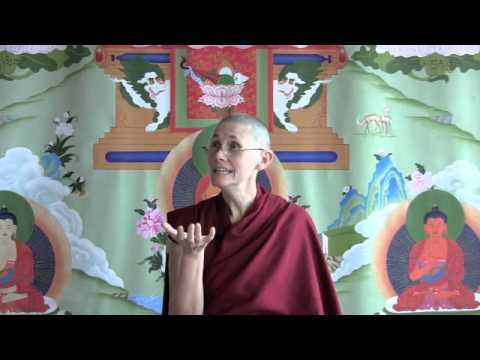Dedicating for awakening
Part of a series of teachings given at the Winter Retreat from December 2011 to March 2012 at Sravasti Abbey.
- Protecting merit through dedication
- Explanation of the dedication prayer
- Concluding the practice by reflecting on emptiness
- Adding to the sadhana dedications
Vajrasatva 32: More on dedication of merit (download)
We were talking about dedicating our merit, and we closed with His Holiness saying, “The primary purpose of dedicating the merit is so the virtue will bring inexhaustible results, lasting until all sentient beings attain enlightenment.”
The purpose of dedicating the merit
That is quite a huge thought: to dedicate our merit, dedicate our practice for that. Sutra source supports this; the sutra requested by Sagaramati says, “Just as a drop of water, poured into a great ocean will not disappear until the ocean runs dry, so too will virtue dedicated to enlightenment not disappear before enlightenment is gained.” It is like that: we add our little drop, we add our little drop, we add our little drop. It is really vital to dedicate it, otherwise, if we just leave it, a couple of things happen. One is, it is what we are taught, that our virtue—our merit—is destroyed by anger and wrong views and that by dedicating it, we protect it from that destruction. I think there is some question about whether we protect it fully at our level until we are really on one of the paths. Starting with the path of accumulation, but regardless, we certainly protect it so that our merit continues on. Secondly, we are steering it in the direction for the best possible good.
We have certainly been spending a lot of time looking at the fact that every negative action results in suffering. The corollary to that is that every virtuous action results in happiness. If we don’t dedicate this merit—assuming that we have created merit on this cushion and haven’t spent the whole hour enraged trying to plot revenge on somebody. (In which case we haven’t created any merit.) Assuming that we didn’t spend the whole time doing that, then if we don’t dedicate it for full enlightenment, then it ripens in some other smaller way.
In our future life, maybe it ripens as winning an all expense paid trip to Hawaii. Or (if there is no Hawaii by then) then winning an all expense paid trip to the coast of Montana. But whatever, (I mean, that would be very nice) that is not why we are spending an hour, five hours, however many hours, doing Vajrasattva practice. That is not our goal. It is not our aspiration. Even if we dedicate for a Dharma motivation (which would be, for example, a precious human rebirth so we can continue to practice) that is also very good but when that rebirth happens, the merit is gone—poof! Done, complete, exhausted.
Whereas, if we dedicate for complete and full enlightenment (implicit in that are) all the things that are necessary along the way, right? So, what is required? We need to have a precious human life in order—or birth in a pure land—in order to achieve that. We need to have reliable qualified spiritual guides, along the path—again and again and again—in order to achieve this. We need to have the means to support our practice (all kinds of physical means) to be able to continue on the practice. All of that is implied in that very vast intention to dedicate this energy for the complete enlightenment of ourselves and of all living beings.
How to dedicate the merit
There are three things we can dedicate for that; we dedicate for the spread of the Buddha’s teachings in others’ mind streams, and in our own. We dedicate to be looked after by spiritual guides in all our future lives, and/or, we dedicate to achieve peerless and complete enlightenment for ourselves and all living beings. Any one of these will accomplish the purpose.
So the dedication prayer that we have at the end of Vajrasattva takes care of two (of these things) explicitly. And then, the third is implicit. So, we say:
Due to this merit, may we soon attain the awakened state of Vajrasattva…
That is our enlightenment.
That we may be able to benefit, relieve all sentient beings from their suffering….
That’s our motivation.
May the precious bodhi mind not yet born arise and grow…
The awakened mind.
May that born have no decline but increase forever more.
So here, we are dedicating for our own enlightenment. We want to do it for the benefit of sentient beings, and we are dedicating that the doctrine will spread and spread and spread, implying that we will be cared for by spiritual guides all along the way. You will see these three in the various sadhanas that we have. They pop up, like in the Tara one, for example, there is an explicit request to be reborn; that we, and all beings, be reborn in the Pure Land. Things like that pop up in the various prayers that we have. But by doing the dedication prayers, reading Shantideva’s whole chapter of dedication in Guide to the Bodhisattva’s Way of Life, we get to experience how the great beings dedicate. As Khensur Wangdak taught us, “…dedicate like them.” And if we are not as eloquent as they are, then it is really okay to say, “I am dedicating this just like he did.” Just like Shantideva did or just like whoever did. That is good enough; it is directing our mind.
The circle of three
We close with what is called “the circle of three.” That is reflecting on the fact that the agent, the object, and the action are all three mutually dependent. So that means what? In this case, the agent is me, the person, the dedicator. The object might be the merit that we are dedicating. We will use that one. And the action is the act of dedicating.
You cannot call anybody a dedicator, unless you have a dedication. You cannot have a dedication, unless you have something to dedicate. You cannot have a dedication unless you have somebody who is dedicating. You cannot have the act of dedication without the dedicator and the thing to dedicate, so all of these elements are mutually dependent. None of them exist inherently from its own side, in its own right.
We can do that with all the parts of the practice. You can make the agent: me, the dedicator; the object is the sentient beings that I dedicate for; the merit that I dedicate for. The enlightenment that we dedicate for might be the object as well. You can look at all these integrated circles of three’s, and the more of these circles of three you see, the more you see how everything is completely interdependent.
If we reflect just a little bit on the interdependence of all those things, that leads us into thinking about the emptiness of inherent existence; they are not findable. They do not exist, from their own side, of their own accord, standing in space, as we have labeled them, in this way. They don’t. And so, it doesn’t matter whether you have much understanding of emptiness or not. Thinking in this way, as we dedicate the merit at the end, helps us get a sense of what that interdependence really is about. It helps us get a sense of reflecting on emptiness, which is very useful. It is also very useful, if you have the kind of mind (I used to have these “thoughts” like, “…what is this merit? It is like there is some big bank up there, and I am winning brownie points…”), and it really irritated me. It was sort of similar to (oh, I don’t know) saving up your good points so you will be good to go to heaven. It was what it reminded me of.
If we think for a second that this stuff is not inherently existent, even though they often actually use the metaphor of putting it in your merit bank, there is no inherently existing merit bank. There is no inherently existing merit coin. These things are not solid and fixed; which is why dedicating our merit works. We are creating the causes, directing our thoughts again and again, towards our goal of awakening. That is why it works.
While dedicating, think about the steps of the path
Venerable Chodron says, when she taught on this, (she also said it is very useful to do this when we are dedicating) to think about the nice steps along the way, too. We dedicate for the full enlightenment of ourselves and all living beings. It is also good to reiterate, “May I have a precious human rebirth where I can meet teachers…” and so forth. It is good because it reminds us that these are the steps that are needed, and the more we train our minds in that, she says, the more likely that dedication will come up as we are dying.
If we have familiarity with that thought, then those thoughts at the time of death will direct them to ripen that way as well. So, although our prayer is very good and concise and includes everything, take an extra moment and think about what that means. Think about the steps along the way: dedicating for a precious human rebirth, never to be separated from qualified Mahayana teachers, recognizing them, following their teachings, and not being a stubborn student; and really wishing to follow them directly; having all conducive circumstances for practice, then we have completed what we started at the beginning. And knowing all the lojong teachings, the Kadampa teachings impact the thought training slogan: something at the beginning, something at the end, something similar to that. Motivate, dedicate. Motivate, dedicate. Then the whole time that we have been doing our Vajrasattva practice (it) really ripens, someday, in our complete and perfect Buddha.
Venerable Thubten Chonyi
Ven. Thubten Chonyi is a nun in the Tibetan Buddhist tradition. She has studied with Sravasti Abbey founder and abbess Ven. Thubten Chodron since 1996. She lives and trains at the Abbey, where she received novice ordination in 2008. She took full ordination at Fo Guang Shan in Taiwan in 2011. Ven. Chonyi regularly teaches Buddhism and meditation at the Unitarian Universalist Church of Spokane and, occasionally, in other locations as well.


